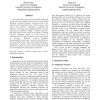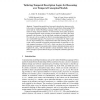70 search results - page 4 / 14 » A Literature Overview of Fuzzy Conceptual Data Modeling |
EUSFLAT
2009
13 years 5 months ago
2009
Fuzzy clustering is well known as a robust and efficient way to reduce computation cost to obtain the better results. In the literature, many robust fuzzy clustering models have be...
EUSFLAT
2009
13 years 5 months ago
2009
One of the new trends in genetic fuzzy systems (GFS) is the use of evolutionary multiobjective optimization (EMO) algorithms. This is because EMO algorithms can easily handle two c...
IDEAS
2007
IEEE
14 years 2 months ago
2007
IEEE
The problem of data integration (query decomposition, data fragmentation) has been widely studied in literature, but the inherent hierarchical nature of XML data presents problems...
HICSS
2005
IEEE
14 years 1 months ago
2005
IEEE
The concept of relevance has been heatedly debated in last decade. Not satisfied with the narrow and technical definition of system relevance, researchers turn to the subjective a...
FROCOS
2011
Springer
12 years 7 months ago
2011
Springer
Temporal data models have been used to describe how data can evolve in the context of temporal databases. Both the Extended Entity-Relationship (EER) model and the Unified Modelli...


